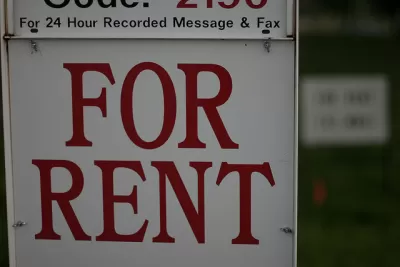Since the 1970s, many American cities have played host to rising rents and stagnant incomes. Richard Florida writes about how the "great rent squeeze" might be choking the country's economic prospects.

Following the Great Recession, Richard Florida writes, Americans have flocked to renting over homeownership. But both modes of housing consumption are getting more unaffordable. "Between 2001 and 2014, the number of renters who spend more than half of their income on rent grew by more than 50 percent, from 7.5 million to 11.4 million renters." Pulling from a new study by Denise DiPasquale and Michael Murray, Florida discusses why rents have increased at more than twice the rate of renter income growth since 1970.
A key point: higher rents may mean less demand for other things, hurting the consumer economy. "The rising share of income devoted to rent may be an important contributor to what economists dub secular stagnation, the inability of our economy to generate the robust demand required to sustain economic growth." Weighed down by rents, especially in major cities, the economy has fewer chances to provide for income growth: a vicious cycle.
Interestingly, Florida writes, the study doesn't assign blame to gentrification or the back-to-the-city movement. Nor does it point to land-use restrictions on rental housing supply. "The actual answer, according to the study, is much more basic. Renters are simply spending more money to consume more housing." Square footages and amenities in rental housing have increased a lot since the 1980s, mirroring a similar bloat in single-family homes.
Florida concludes by calling excessive demand for housing a "fetter on economic growth."
FULL STORY: The Great Rent Squeeze

Planetizen Federal Action Tracker
A weekly monitor of how Trump’s orders and actions are impacting planners and planning in America.

Maui's Vacation Rental Debate Turns Ugly
Verbal attacks, misinformation campaigns and fistfights plague a high-stakes debate to convert thousands of vacation rentals into long-term housing.

Restaurant Patios Were a Pandemic Win — Why Were They so Hard to Keep?
Social distancing requirements and changes in travel patterns prompted cities to pilot new uses for street and sidewalk space. Then it got complicated.

In California Battle of Housing vs. Environment, Housing Just Won
A new state law significantly limits the power of CEQA, an environmental review law that served as a powerful tool for blocking new development.

Boulder Eliminates Parking Minimums Citywide
Officials estimate the cost of building a single underground parking space at up to $100,000.

Orange County, Florida Adopts Largest US “Sprawl Repair” Code
The ‘Orange Code’ seeks to rectify decades of sprawl-inducing, car-oriented development.
Urban Design for Planners 1: Software Tools
This six-course series explores essential urban design concepts using open source software and equips planners with the tools they need to participate fully in the urban design process.
Planning for Universal Design
Learn the tools for implementing Universal Design in planning regulations.
Heyer Gruel & Associates PA
JM Goldson LLC
Custer County Colorado
City of Camden Redevelopment Agency
City of Astoria
Transportation Research & Education Center (TREC) at Portland State University
Jefferson Parish Government
Camden Redevelopment Agency
City of Claremont





























